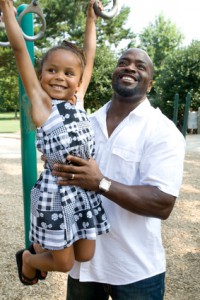Dad’s Superpower & Children’s Self-Control

Fathers have a superpower, a superpower that contributes to their children’s emotional future. What is this superpower? Play! Yes, play. Researchers at Cambridge University and the Lego Foundation uncovered this superpower in a review they completed of 78 studies. Each study examined the impact of fathers playing with their children (zero to three-years-old). The results were published in the Developmental Review in September, 2020. Let me share two of the findings from this review.
- Father-child play tended to be more physical than mother-child play. Fathers were hands on. They liked to pick up their infants and engage in rough and tumble play with their toddlers. They enjoyed playing chase and wrestling, swinging, and bouncing.
- Father-child play improved emotional and behavioral outcomes. Specifically, more father-child play was associated with less hyperactivity and fewer behavioral problems in school. More play with fathers contributed to the children exhibiting a better ability to control their aggression. The children also exhibited fewer emotional or physical outbursts during disagreements at school.
It seems that physical play with dad helped children develop better emotional and behavioral self-regulation. The authors believe this improved self-regulation occurs in at least three ways.
- During the rough and tumble play, fathers model self-regulation by controlling their own strength, actions, and words. Children also control their own strength, actions, and words to avoid “hurting” their dad. Of course, seeing self-regulation modeled and engaging in self-regulation themselves is a wonderful practice in self-control.
- During rough and tumble play, a father or child may experience an accidental minor hurt (a foot gets stepped on, a ball bounces the wrong way and smacks someone in the face). When such an accident occurs, that play stops momentarily to make sure everyone is OK. Then the fun continues. Both have survived the minor accident. Both have learned to better control themselves to avoid similar hurts in the future.
- During father-child rough and tumble play, children may also experience times in which they “get carried away” and Dad must slow the play down. Their children follow suit, learning to better regulate their behavior and emotions.
This all adds up to children who learn better emotional and behavioral regulation from their Dad’s superpower, play! Now get out their Dad and put that superpower to use. Play with your child today!
-0 Comment-